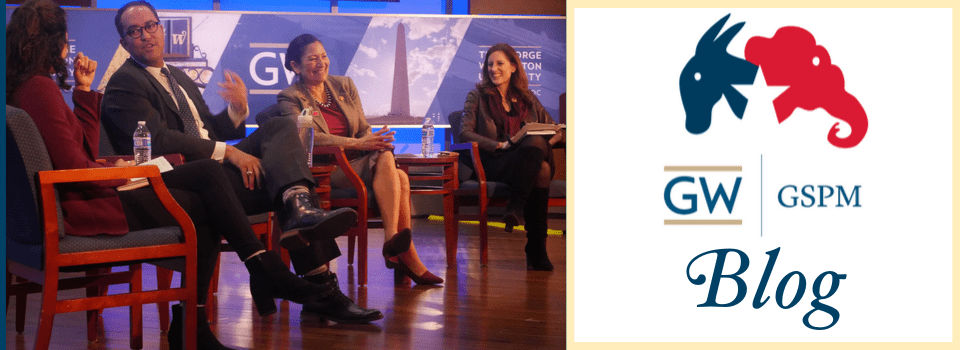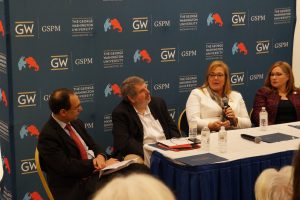The 2016 presidential election took nearly everyone by surprise, with political neophyte Donald Trump winning over Hillary Clinton, one of the most well-known political figures ever. A panel of GSPM adjunct faculty, who are also leading campaign strategists with several presidential campaigns on their resumes, weighed in on what happened and what comes next in the worlds of campaigning and political consulting.
The biggest change in the 2016 cycle was the explosion of content that campaigns needed to produce to stay competitive. “Politics has become very personal and the ways to consume content have too, and the more ways there are to consume content the more content there needs to be,” said Evan Tracey, Political Management Adjunct Professor and Senior Vice President at the political advertising firm National Media Research, Planning, and Placement.
Peter Fenn, a long-time media consultant, says the old model of big media buys are coming to an end. “I call paid media now ‘pay more get less’ media. We’re in a situation where fewer and fewer people are watching television commercials and it’s more about targeting and figuring out where undecided voters are and appealing to them personally,” he said. He noted that data analytics and consumer segmentation are going to drive campaign strategy to an ever-larger extent.
For another expert, the need to understand national dynamics was key. “You needed to be a master of the modern media environment to be a successful candidate,” said Adjunct Professor Suzanne Zurn, founder of the Three Lines Group. She lamented that part of that understanding was that in an increasingly polarized society, factual accuracy was less important than in the past.
That understanding of the media environment allowed Trump, who frequently eschewed conservative policy principles and campaign norms, to thrive. Mark Mellman, a Democratic strategist, noted that Trump was able to build a coalition by bringing together three strands of conservative thought: people’s aversion to government, change, and difference. A general political malaise helped the outsider candidate as well. “People didn’t think he would win, so he was a good protest vote,” said Mellman. Katie Packer, who ran a Republican SuperPAC opposed to the Trump campaign, noted that none of the other candidates were willing or able to stop the New Yorker’s momentum. “In campaigns, opponents don't just die people kill them, metaphorically of course,” she said.
In addition to offering a post-mortem of the past, the panelists also gave some advice to students just starting their political careers. “When you start in politics you should be knocking on doors" said Fenn. “And when you get older you should keep doing it. I love knocking on doors." He also cautioned against the caricature of the wealthy campaign consultant. “Don't go into political consulting to get rich. You can make money sure, but you gotta love it in order to succeed.”


